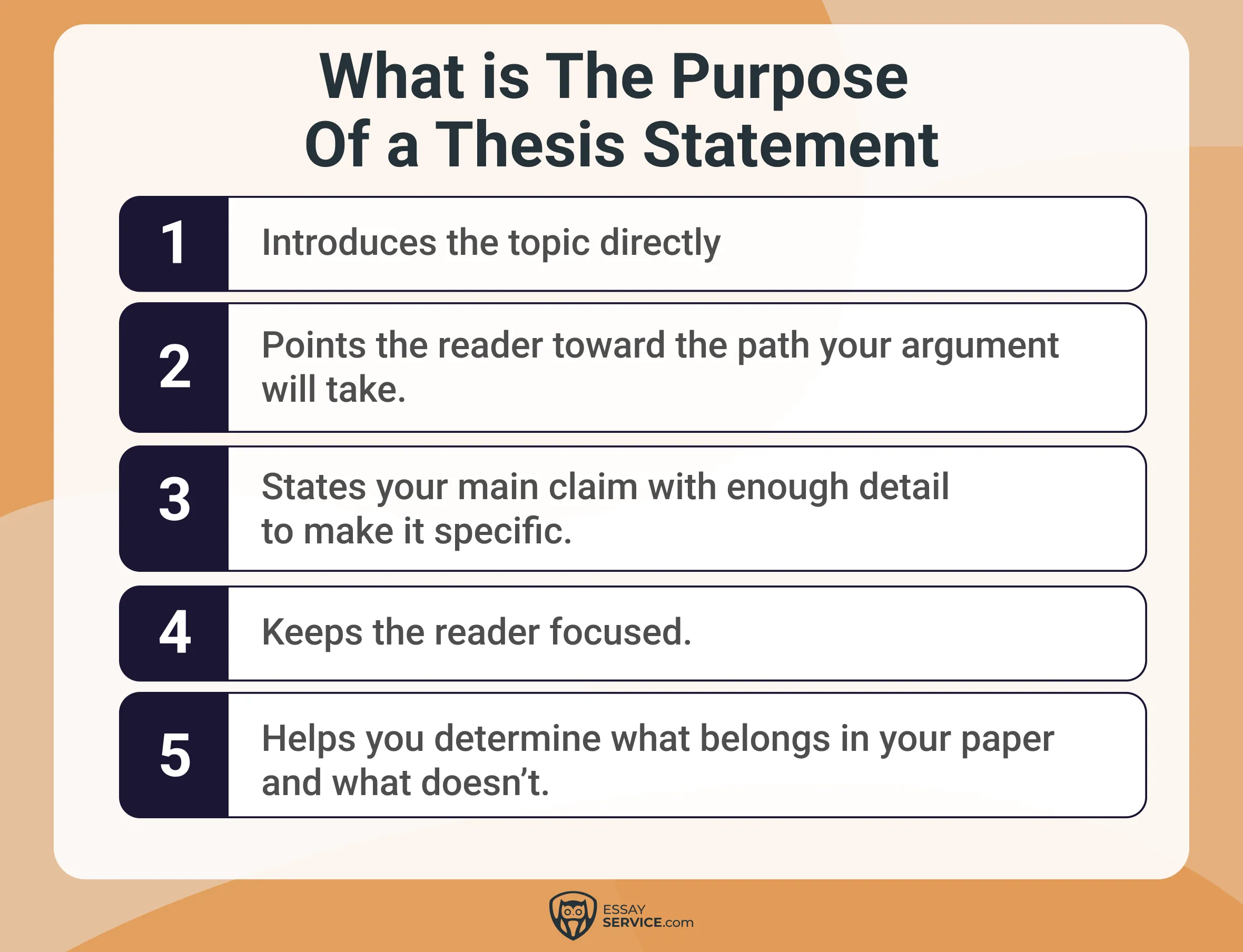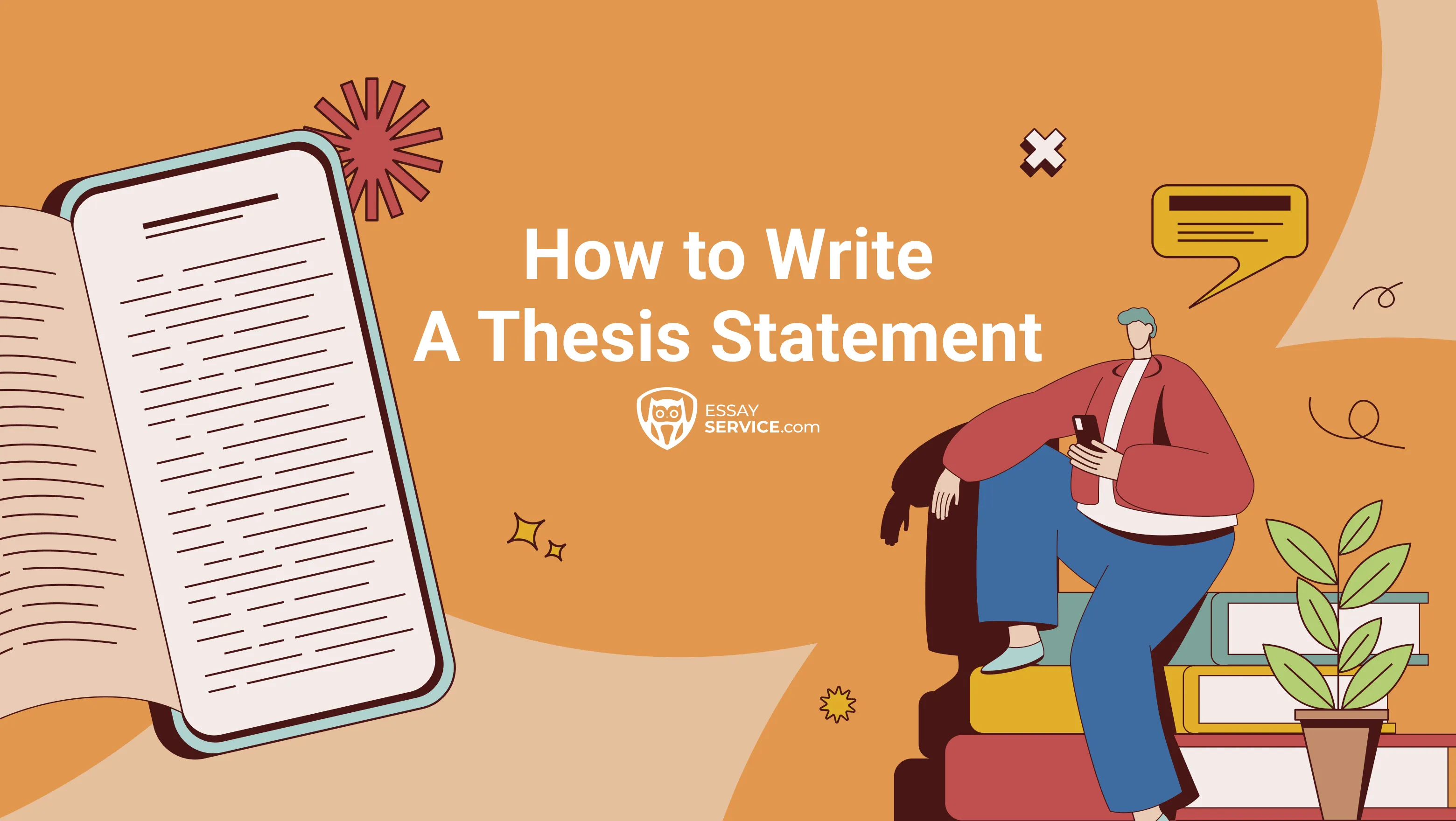Every essay needs something to tie it together. That something is the thesis statement, the anchor to your paper. A sentence or two that each one of your ideas connects to. Without it, your ideas start to drift. Everything stays focused if it's written well.
By the end of this article, crafting a strong thesis will probably feel less out of reach. If this step has ever left you stuck, that's more than okay, too: writing takes practice, and there's no shame in asking for help. EssayService's professional writing service can connect you with experts who can turn scattered thoughts into well-structured papers.
What is a Thesis Statement?
A thesis statement is a brief sentence summarizing your essay's primary point. It informs the reader about what the paper will be about and in which direction it's going. When you concentrate on writing a thesis statement first, the rest of your essay has a direction to follow.
Here’s the difference a good one makes:
- Weak thesis: Social media is bad for teenagers.
- Better thesis: Teenage social media usage increases anxiety through unrealistic expectations and exposure to cyberbullying.
What is the Purpose of a Thesis Statement?
The thesis statement says what to expect from your essay. That's its role. It's a line that gives your paper a sense of direction right from the get-go. A strong thesis does a few things at once:

- Introduces the topic directly.
- Points the reader toward the path your argument will take.
- States your main claim with enough detail to make it specific.
- Keeps the reader focused.
- Helps you determine what belongs in your paper and what doesn’t.
When the thesis feels strong, everything else (your points, your evidence, your flow) falls into place with less effort.
What are the Different Types of Thesis Statements?
Different essays call for various theses. Knowing which fits your paper will help you write a good thesis statement regardless of the assignment.
Characteristics of Thesis Statement: What Makes One Good
A strong thesis does more than announce the topic. It makes a clear point and gives your essay purpose. You can usually tell right away when it works.
Bad example: Pollution is a problem.
Good example: Pollution in urban areas worsens respiratory health and calls for stricter environmental rules to protect public safety.
Bad example: Technology is useful.
Good example: Rapid advancements in technology improve communication, reshape education, and raise new concerns about data privacy.
Refine your thesis whenever you feel unsure about it. If you need extra support crafting one, you can always buy essays from EssayService's professionals.

Formula How to Write a Thesis Statement
In its most basic form, a thesis statement can be constructed using the following formula. Whether you're writing a synthesis essay or any other type, this formula will come in handy:
Topic+Claim/Argument+Reasons/Evidence
- Topic: Identify the main subject or topic of your essay. This sets the context for your thesis statement and informs the reader about the focus of your discussion.
- Claim/Argument: State your position or argument regarding the topic. This is the central assertion that your essay will seek to prove or defend.
- Reasons/Evidence: Provide one or more reasons or pieces of evidence that support your claim. These serve to justify your argument and convince the reader of its validity.
Example:
Topic: The Impact of Social Media on Teenagers
Claim/Argument: Social media has a significant influence on the mental health of teenagers.
Reasons/Evidence: Increased screen time has been linked to higher rates of anxiety and depression among adolescents, cyberbullying on social media platforms contributes to emotional distress, and excessive use of social media can disrupt healthy sleep patterns.
Thesis Statement: 'The pervasive use of social media among teenagers negatively impacts their mental health through increased rates of anxiety, cyberbullying-induced emotional distress, and disruption of healthy sleep patterns.'
How to Write a Thesis Statement in 6 Steps
Every good essay starts with a single line. When trying to figure out how to write a thesis statement example, getting that line right can feel tricky, sometimes even frustrating. But once you have it, the rest of the writing flows with far less effort.
.webp)
Step 1: Choose the Right Topic
The topic you choose decides the entire writing process. You need to choose something interesting that:
- It connects directly to the subject or assignment.
- You have enough material or sources to work with.
- It feels interesting enough to keep you engaged.
- It allows for a clear argument rather than being too broad.
Step 2: Break Down the Prompt
Before you start writing, make sure you really understand what’s being asked. Break the prompt down:
- What’s the core question or issue?
- What type of response is expected?
- What evidence or examples will support your point?
- Are there any specific guidelines or requirements?
Step 3: Identify Your Position Clearly
At this point, you should start thinking about what you want to say. This is the stage where your thesis begins to take some kind of shape. Remember to keep your position specific, the reader should have no doubt about what the essay will argue.
Control questions to guide you:
- What is my main point about this topic?
- Why is this point important?
- Will my position be clear to someone reading only this sentence?
Step 4: Focus Your Argument
A thesis statement is an argument that needs to hold up under scrutiny. When writing a strong thesis statement, your claim must be narrow enough to prove but broad enough so it can still be debatable.
Examples:
- Bad thesis: Exercise is good for you.
Good thesis: Regular physical activity improves heart health and reduces the risk of chronic illnesses.
Examples of good arguments:
- Remote work improves productivity and work-life balance.
- Renewable energy reduces environmental damage and creates economic opportunities.
Examples of bad arguments:
- Technology is good.
- Pollution is bad.
If you still find yourself thinking, 'I wish I could pay someone to write my paper,' you can rely on EssayService's professionals to take over.
Step 5: Provide Solid Justification
A strong thesis hints at the reasons behind what it says. Think about the “why” behind your claim when developing a thesis statement. Add a sense of direction by showing what evidence will back it up.
Example to see the logic:
- Weak: School uniforms are good.
- Stronger: School uniforms promote equality among students by reducing visible social and economic differences, creating a better learning environment.
Step 6: Refine and Revise
Once the essay is finished, circle back to your thesis. Ask yourself if it still matches what you’ve written. If it feels off, tweak it. Those small revisions can make your entire paper much stronger. Checklist for polishing:
- Does it answer the prompt directly?
- Is it one clear sentence?
- Does it set up the structure of the essay?
- Is it specific without being too narrow?
- Will it make sense to someone outside the topic?
These questions work across all types of writing, whether you're writing an expository essay or a synthesis paper.
Thesis Statement Example
Seeing real examples helps unlock the structure. A thesis is not just an opening line. It sets momentum, builds the foundation, and guides every sentence that follows. Below are examples across several essay types. Each one reflects a different purpose and rhythm.
- Argumentative Essay: A higher minimum wage has the potential to transform lives among low-income workers. While some fear job losses, research shows the overall improvement in well-being carries greater weight.
- Analytical Essay: In Hamlet, the soliloquies do not just fill silence, rather they speak the unspeakable. Through them, the audience sees beneath the prince’s calm exterior. Doubt grows, fear stirs, and the inner chaos unfolds, slowly and without mercy.
- Expository Essay: Photosynthesis is the quiet force behind life. It fills the air with oxygen, pulls energy from sunlight, and fuels the chains that connect every living thing. Remove it, and the balance shatters step by step and the system begins to break.
- Narrative Essay: A summer spent working the land changed something in me. Each sunrise brought the same tasks, the same fields, the same weight in my hands. Over time, effort turned into understanding. Persistence stopped being an idea and became a habit.
- Cause-and-Effect Essay: Cut down enough forests, and the air starts to shift. Carbon rises. Habitats vanish. Weather patterns twist. These are not distant problems. They are here now, pressing closer, louder, harder to ignore with every lost tree.
- Comparative Essay: Online classes offer freedom and convenience. But they also bring new problems, like keeping students engaged and involved.
- Evaluative Essay: The movie looks great but falls short emotionally. Without a strong story, it ends up feeling empty despite its visual style.
Do’s and Dont’s of a Strong Thesis
A handful of clear rules might be just what you need when creating a strong thesis statement. Keep these tips in mind:
Final Thoughts
At the heart of every solid essay is a thesis that holds the whole piece together. The best ones don’t just appear out of thin air but rather from a focused topic and a clear stance. You'll most likely tweak it more than once during the writing process, and that's exactly how it should go.
There’s no need to panic if the words refuse to line up. You can always order essay help from EssayService. Our professional writers know how to turn messy ideas into strong statements that set your essay on the right track.
Frequently Asked Questions
What Three Things Must a Thesis Statement Have?
A thesis needs three things: a topic, a claim about the topic, and a hint at supporting evidence.
How Long Should a Thesis Statement Be?
One or two sentences. It should express the main idea with a sense of direction but still remain sharp.
Can a Thesis Statement Be a Question?
A thesis should make a claim, not ask one. Questions can guide your thinking, but the final statement must be a clear answer.

Jennifer is a student currently pursuing a Journalism major. She oversees the EssayService blog team and uses her journalism skills to ensure all blog posts are accurate, trustworthy, and engaging.
- Thesis Statements. (n.d.). UCLA History Department. https://history.ucla.edu/thesis-statements/
- SurvivalGuide WRITING A THESIS STATEMENT. (n.d.). https://www.uwa.edu.au/students/-/media/Project/UWA/UWA/Students/Docs/STUDYSmarter/ES1-Writing-a-Thesis-Statement.pdf
New posts to your inbox
Your submission has been received!



